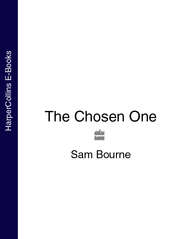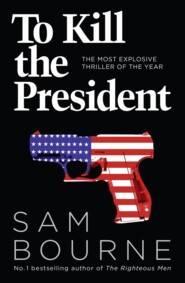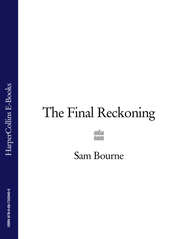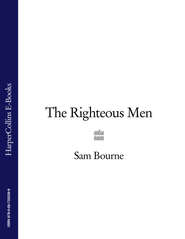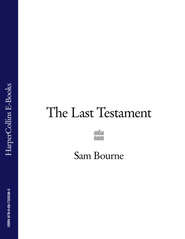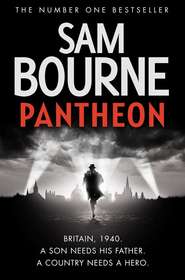По всем вопросам обращайтесь на: info@litportal.ru
(©) 2003-2024.
✖
Sam Bourne 4-Book Thriller Collection
Автор
Год написания книги
2018
Настройки чтения
Размер шрифта
Высота строк
Поля
‘And you have done this all by yourself? No one is paying you to do this? You don’t work for any organization? You did this purely out of the goodness of your own heart?’
‘Yes, but this is not important,’ Mohammed said through the interpreter. ‘I am not important.’
At that, the visitor smiled and said, ‘Good.’
‘People are dying here,’ Mohammed continued. ‘What help can you give them? Urgently!’
The visitor smiled again. ‘Oh, I can promise them the greatest help of all. And it won’t be long to wait. Not long at all.’
He then clicked the two side-locks of his briefcase and produced a syringe. ‘First, I want to say what an honour it is for me to meet you. It is an honour to know that the righteous truly live among us.’
‘Thank you, but I don’t understand.’
‘I’m afraid I need to give you this. It’s important that a man such as yourself should feel no pain or suffering. No pain or suffering at all.’
Suddenly the interpreter was gripping Mohammed’s arm, forcing him onto the ground. Mohammed tried to escape, but he was too weak and this hand too strong. Now, towering over him, was the visitor, holding the syringe up to the light. He was speaking in English, lowering himself closer to Mohammed. As he did so, the interpreter was whispering directly into his ear.
‘For the Lord loves the just and will not forsake his faithful ones. They will be protected forever, but the offspring of the wicked will be cut off.’
Mohammed was writhing, struggling to break free. And still the voice was speaking, its breath hot.
‘The wicked lie in wait for the righteous, seeking their very lives; but the Lord will not leave them in their power or let them be condemned when brought to trial. The salvation of the righteous comes from the Lord; he is their stronghold in time of trouble.’
Finally he felt the needle break the skin of his arm and, as the sky darkened, he heard the words of a prayer, until the voice grew distant and all was silent.
FIFTY-EIGHT (#ulink_600643ae-45be-5f90-a5f1-c69c23ef77fe)
Monday, 2.50pm, Brooklyn
Now it was Will’s turn to take charge. He all but pushed Tom out of his chair, and instantly returned to twenty-first century journalism’s base camp: Google.
‘Church of the Reborn Jesus’ brought up a page of entries, but they were thin. To Will’s surprise, the group did not have a website of its own.
He clicked the first entry, a link to a paper delivered at a University of Nebraska conference.
Though never large in number, the Church of the Reborn Jesus achieved great influence at its height a quarter century ago, especially among young Christian intellectuals. Central to its teaching was a radical brand of replacement theology, the belief that Christians had replaced the Jews as God’s chosen people . . .
Maddeningly, the article said nothing more, rambling off into a wider discussion of campus Christianity in the 1970s. But Will was on a roll. He could tell TC was keeping up, yet both knew, intuitively, there was no time to waste on discussion. He went straight to Wikipedia, the online encyclopaedia and typed in ‘replacement theology’.
It took a few seconds, during which Will’s right foot pulsated – partly in anxiety, partly in excitement. A half-buried memory was nagging away at him. The Church of the Reborn Jesus: he had seen that name before, somewhere at the office . . .
Then a page appeared, headlined Supersessionism. It was defined as ‘the traditional Christian belief that Christianity is the fulfilment of Biblical Judaism, and therefore that Jews who deny that Jesus is the Jewish Messiah fall short of their calling as God’s chosen people’.
Will skimmed to the next paragraph. ‘It argues that Israel has been superseded . . . in the sense that the Church has been entrusted with the fulfilment of the promises of which Jewish Israel is the trustee.’
The entry noted that while several liberal Protestant groups had renounced supersessionism, ruling that Jews and ‘perhaps’ other non-Christians could find God through their own faith, ‘other conservative and fundamentalist Christian groups hold supersessionism to be valid . . . the debate continues.’
And I bet I know where it continues, thought Will. He went back to Google, now narrowing his search to ‘Church of the Reborn Jesus and replacement theology’. Three references, the first an article from The Christian Review.
‘. . . Replacement theology became increasingly unfashionable in this period, discredited by the politically correct crowd, said its defenders. A few years earlier, it had enjoyed a vigorous revival chiefly through a cerebral grouping known as the Church of the Reborn Jesus. According to this group, Christians had, by their recognition of Jesus as the Messiah, not only inherited the Jews’ status as the elect, but inherited Judaism itself. The Jews had, the Reborn Jesus movement argued, ignored God’s direct wishes and therefore forfeited all that they had learned from Him. They had disinherited themselves from their role as the chosen people but – and this is what set the Church of the Reborn Jesus apart – the Jews had also abandoned their own traditions, customs and even folklore. From now on, those were to be regarded as the possessions of committed Christians.’
‘Stop.’ It was TC, white-faced. ‘That’s the key point, right there. Their own traditions, customs, even folklore. This group believes that Judaism contains the truth, not for Jews but for Christians. Even the folklore. Don’t you see? They’ve taken it all. The mysticism, the kabbalah, everything.’
‘The story of the righteous men,’ said Will.
‘Yes. They don’t think this is some weird Hassidic tradition. They think this belongs to them. They believe it’s true.’
He clicked on the next Google result. It was a link to an evangelical discussion group. Somebody calling themselves NewDawn21 had written a long posting, apparently in reply to a question about the origins of the Church of the Reborn Jesus.
In its day it had quite an impact – kind of the smart end of the whole Jesus freak, sandal-wearing movement. It was centred on this very charismatic preacher who was then a chaplain to Yale, Rev Jim Johnson.
Will looked up at TC. ‘I know that name,’ he said. ‘He founded some evangelical movement in the seventies. Died a few years ago.’ But TC was reading on.
‘Apparently Rev Johnson influenced a whole generation of élite Christians. They called him the Pied Piper on campus, because he enjoyed such a dedicated following.’
I can vouch for that, said the posting below. I was at Yale in that period and Johnson was a phenomenon. He was only interested in the A-list, top-flight students – editors of Law Review, class president, those guys. We called them the Apostles, hanging around Johnson like he was the Messiah or something. For anyone interested, I’ve scanned in a picture from the Yale Daily News which shows Johnson and his followers. Click here.
Will clicked and waited for the picture to load. It was grainy, in drab, 1970s colour and it took a while to fill the frame. Slowly it came into view. At the centre, wearing a broad grin, like the captain of a college football team, was a man in his late thirties, wearing an open-necked shirt and large glasses with the curved, rectangular frames that were then regarded as super-modern. He wore no dog-collar, no dark suit. He was, Will concluded, what the Victorians would have called a muscular Christian.
Surrounding him were young, serious-looking men, exuding that born-to-rule confidence that radiated out of Yale or Harvard yearbooks. The hair was long or bulky, the shirt collars and jacket lapels wide. The faces seemed to shine with possibility. These men were not only going to rule the world. It was quite clear they believed they would do it with Jesus’s blessing.
‘I think you need to hurry,’ said Tom, now taking up Will’s previous position by the curtain. ‘There’s a car outside. Two guys are getting out and coming into the building.’
But Will was hardly listening. Instead he was pushed back into his seat with surprise: he had recognized one of the faces in the photograph. He was only able to because he had seen another, different picture of this same man in his youth recently. The paper had run it when he was appointed. There, at Jim Johnson’s side, was none other than Townsend McDougal – the future editor of the New York Times.
‘I don’t believe it,’ Will said.
‘It’s him, isn’t it?’
Will was confused. How would TC recognize McDougal?
‘I didn’t want to say, because I wasn’t sure. But it really couldn’t be anyone else.’
Will looked up at her, crinkling his eyebrows to register his puzzlement. ‘Who are you talking about?’
‘Will! They’re coming up. You’ve got to go!’
‘Look,’ said TC, taking her finger to the far left of the back row of the picture – an area Will had barely examined. TC stopped at a lean, handsome young man with a full head of thick hair. He was unsmiling.
‘Maybe I’m wrong, Will. But I think that’s your father.’
FIFTY-NINE (#ulink_d3f112db-c531-5949-842d-70553e9820ba)
Monday, 2.56pm, Brooklyn
Tom had fairly wrenched Will from the chair and out the window, sending him plunging down the fire escape. He nudged TC the same way and was about to follow himself when he looked back. The computer screen was still alight with information. It would be too terrible, thought Tom, if his machine, always such a loyal ally, were to end up giving them all away.
He rushed TC out, then moved over to the desk and started frantically closing down programmes. It was while he was shutting down the internet browser that the door flung open.






